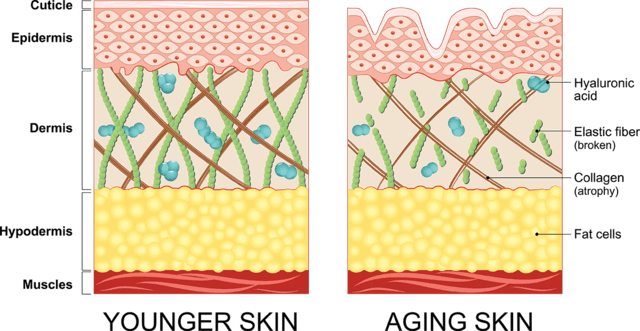
What is collagen and how does it affect ageing?
Most people have heard of collagen and know that it’s something to do with skin. Did you know that collagen actually makes up around 80% of your dry skin weight? Collagen is abundant all over our body, in our joints and ligaments as well as our skin.
As we age our collagen starts to deplete, from our mid twenties we start to lose around 1% per year, in the 5 years following the onset of the menopause you can expect to lose around 30% of collagen and this loss will continue at around 2.1% a year. This is often the time when people feel they have ‘aged overnight’.
Why is this important and what does it mean for our skin?
Collagen is what gives our skin structure and bounce, As we age, changes occur within the structure of the dermis and epidermis and the density of the collagen decreases, in turn the thickness of the dermis also decreases. Collagen fibres begin to fragment, become shorter, irregular and less organised, as a result the collagen fibres lose their ability to retain moisture and the skin loses elasticity and becomes more wrinkled. Prevention is better than cure, the earlier you start to protect and boost your collagen, the better, although its never too late and results can be seen from using evidence based products in as little as 8 weeks!
So what can we do to boost our collagen production?
Luckily there are lots of things with a good clinical evidence base that have been shown in the research to have a positive effect on collagen production and the skin. Below are 3 things that are easily incorporated into your daily routine to boost collagen and keep skin healthy and supple.
- Cosmeceutical skincare, specifically Vitamin C and Retinol.
- Collagen supplements
- SPF
Vitamin C is essential for collagen production, your body cannot make collagen without it, it is required for the cross linking of collagen fibres into their strong rope like triple helix structure. Using a Vitamin C serum has been proven to increase type 1 and type 3 collagen which are the most abundant types within the skin. This can improve the appearance of lines and wrinkles.
Retinol is a derivative of Vitamin A and part of the retinoid family. It is the action of retinoic acid on DNA that accounts for its biological effects on the skin such as the control of epithelial cell proliferation and differentiation, immune modulation, stimulation of the creation of new blood vessels, and production of collagen. In addition, retinol is an antioxidant, which protects DNA, cell membranes and proteins from UV-induced free radical damage. There are more than 700 published studies showing how retinoids are helpful in treating ageing skin by increasing firmness, reducing lines and wrinkles and improving skin tone and texture.
Collagen supplements. There are multiple studies that show great effects on the skin following a daily dose of oral collagen. Studies show a significant increase in skin hydration, skin elasticity and a reduction of wrinkles when comparing those who took a daily collagen supplement to a placebo group. Marine collagen has been found to have superior bioavailability in the body (absorption) so always choose a high quality marine collagen supplement with around 5000-10,000mg of collagen peptides.
Wear SPF! It’s known that UV radiation causes collagen to break down at an increased rate. A broad spectrum SPF should be worn every single day, even in winter! Think of SPF as a body guard for your skin, protecting your skin against damage from UV light.
Is there anything else that helps?
In clinic treatments such as Endymed and Profhilo have been specifically developed to produce new collagen in the skin and again, are backed by research studies and proven to stimulate new growth of collagen and elastin, resulting in plumper, younger looking skin.
Back to blog
